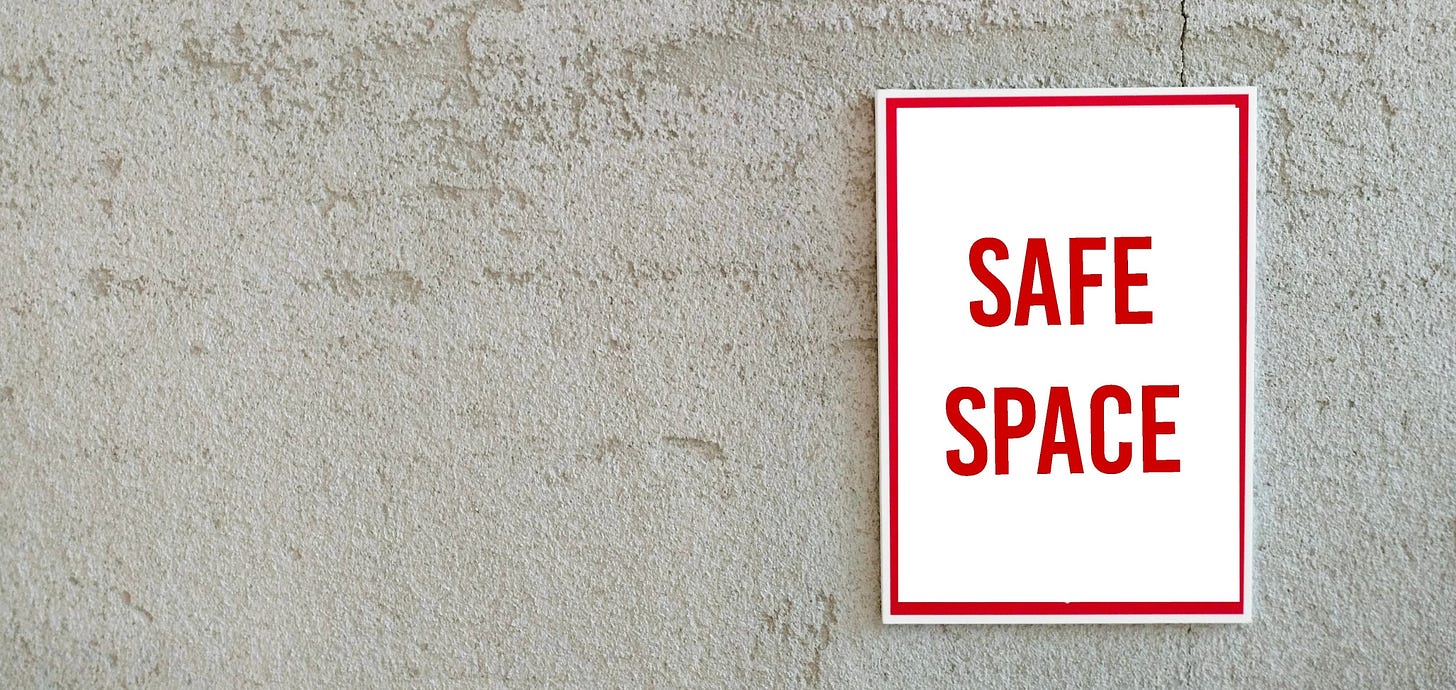E-Pluribus | October 17, 2023
Campus free speech in trouble; the new antisemitism; freedom and your car.
A round-up of the latest and best musings on the rise of illiberalism in the public discourse:
Nathan Goetting: A College Free-Speech Crisis: When Safety Becomes Dangerous
Raising the next generation always involves risk, physical and emotional. If young people are not exposed to some risk, they never learn to face challenges on their own as adults. At Discourse Magazine, Nathan Goetting says the current college campus practice of trying to “protect” students from the “harm” of what they might hear of read is doing them a grave disservice.
The recent abandonment of free speech values on campus doesn’t seem to be the result of negligence or mistake. Instead, it’s the manifestation of a new political conviction that other social and political interests—namely those consistent with the illiberal values of the “Great Awokening” or what author Wesley Yang calls “the successor ideology”—are more important than the pursuit of truth.
The most essential aspect of a student’s identity should be that of truth-seeker. The common quest for knowledge should bring all students together in a common cause, regardless of the other aspects of their identity. But that’s far from the way things are on today’s college campuses, where identity is far more atomizing than uniting.
At the core of the ideology now prevalent on campuses is a kind of extreme identitarianism that prioritizes certain nonintellectual features, such as race and sex, as the most important characteristics of an individual’s identity. Faculty and staff teach this identitarianism in courses and implement it in campus policies. Predictably, students then divide into groups, including college-recognized student organizations, according to these identities.
These divisions take root and harden. We’ve now reached the point that some universities allow racially segregated housing and think it wise to hold separate graduation celebrations according to race, gender identity and sexual orientation. As a result, scholarly inquiries into identity issues are frequently treated as threats. Even the most reliable test of truth, skeptical questioning, is rejected as hate. Consequently, higher education has entered a transitional stage: It’s moving away from truth-seeking to truth-preaching.
Read it all here.
David Bernstein: Woke Antisemitism—A Reckoning
It’s been bubbling up for years, but the Hamas terror attack in Israel this month clearly exposed the antisemitism running through the progressive left. David Bernstein, author of Woke Antisemitism, argues in a piece for Quillette that too many leftists gave in to their worst impulses following the slaughter, which should (and may) serve as a wake-up call.
There are two distinct but overlapping camps of the social justice left. The radical decolonization camp is made up of extremist academics, anarchists, and Black Lives Matter activists. It is anti-Western, anti-American, and antisemitic to its core. It would be easy to dismiss these people as ideological quacks—if it were not for their outsized role in US educational institutions.
[. . .]
Those of us fighting the decolonizers have a golden opportunity to discredit them and undercut their influence in the days ahead. In their rationalizations of violence against Jews and Israelis, they’ve outed themselves as the extremists they are. School superintendents who might have seen them as credible educational partners in the new “diversity” initiatives will now have a hard time justifying their role to school boards and community members.
Then there’s the reformist, DEI camp, populated by people who have been deeply influenced by the same forms of neo-Manichaean postmodern thought, but who seek not to overthrow the capitalist system, but to reshuffle the deck of power. Unlike the decolonisers, their antisemitism tends to be latent. They insist that Jews are white, place them in white racial “affinity groups” and frequently downplay the validity of antisemitic claims as distractions from the important task of combating anti-blackness. They include mealy-mouthed university presidents and school superintendents, who see Muslims as a marginalized community and thus susceptible to “harm,” whereas Jews are a privileged minority and thus immune from such harm. These administrators are often held captive by the commitments and hires they made in the summer of 2020 during the great American racial reckoning.
[. . .]
I have never been entirely at ease making the case for the growth of “woke antisemitism” in liberal humanist circles. Liberal humanists like me are highly suspicious of promiscuous accusations of racism and bigotry, and oppose dogmatic declarations that only marginalized groups with “lived experience” of oppression are entitled to an opinion on social issues. Such political attitudes are the essence of cancel culture. Yet here I was arguing that the very ideology that produced cancel culture also fueled a new variant of antisemitism that sees Jews as white and privileged. In highlighting the threat of antisemitism, I was concerned that I might be engaging in the same tactics as the people I critique.
From the outset, however, I made it clear that I didn’t regard my analysis of antisemitism as beyond scrutiny. I reject the now oft-repeated claim among some Jews, who, echoing the assertions of minority political activists in other communities, argue that only Jews get to define antisemitism. I sought to discuss antisemitism in liberal, not postmodern terms, encouraging multiple viewpoints about the extent and nature of contemporary Jew hatred. But in the eyes of some fellow liberal humanists, I was still partaking in the identity politics of the day.
Now, in the aftermath of the massacre, I sense a shift. Awakened by the outpouring of Jew hatred in the wake of the massacre in Israel, many liberal humanist friends have expressed their shock. This magazine’s editor-in-chief Claire Lehmann has stated, “I don't think I ever really understood anti-Semitism until now. And it is frightening.”
Read the whole thing.
Joseph C. Sternberg: The Culture War Is Coming for Your Car
The battle over cars and climate change has raged for decades. Over at The Wall Street Journal, Joseph Sternberg argues that the fight is now going beyond environmental concerns and morphing into a deeper cultural dispute. Sternberg cites Britain’s Conservative Party as an example of the increasing pushback from the right.
The car is becoming a cultural flashpoint because it is where climate-apocalypse proselytizing meets antielitist pragmatism. Both sides increasingly understand their fundamental values are at stake.
The left has received several warnings already about the resulting culture-war dangers. In France, Emmanuel Macron’s administration was derailed in 2018 by yellow-vest protests in rural areas occasioned by a tax increase on diesel fuel. German Chancellor Olaf Scholz’s rickety coalition government was shaken in 2022 by a fierce debate over speed limits on the autobahn proposed partially for climate reasons. The U.K.’s Labour Party this summer narrowly lost a parliamentary by-election it was expected to win, when voters lodged a protest against a Labour-imposed tax on older cars in greater London.
An oddity is that up to now the right hasn’t treated the car as a culture issue, more often debating electric vehicles in economic or scientific terms. That may be starting to change, with Britain’s Conservative Party leading the way.
The Tories under Prime Minister Rishi Sunak are widely expected to lose an election next year. Desperate for a wedge issue to wield against Labour, Mr. Sunak has embraced the internal-combustion engine. He recently scaled back the government’s previous mandate that all new cars sold after 2030 be electric. Notably, he cast this policy decision as a values judgment—that it wouldn’t be right to force British households to pay for London’s climate pieties.
At this week’s annual party convention, Mr. Sunak canceled a high-profile high-speed rail line that was to have connected London to Birmingham and Manchester. Backers often hyped the line’s low-carbon potential, despite doubts about the project’s overall carbon efficiency. No matter, Mr. Sunak now suggests the government’s priority should be fixing potholes for the many people who must drive in the course of their daily lives.
Them’s culture-war fightin’ words. The green left hates investment in road building because it hates the car. Mr. Sunak is attempting to put himself on the side of households and businesses that value the freedom of cheap mobility more—and for whom cheap mobility is a matter of economic survival.
Read it all.
Around Twitter (X)
Yascha Mounk availed himself of X’s long-form format, so just a portion is available below. Click through to read the whole post about the left’s Hamas problem:
Some rare, encouraging news out of Yale Law School, including a humorous exchange between George Mason law professor David Bernstein and Yale’s new hire:
And finally, a discouraging example of illiberalism, and worse, on the campus of New York University:










